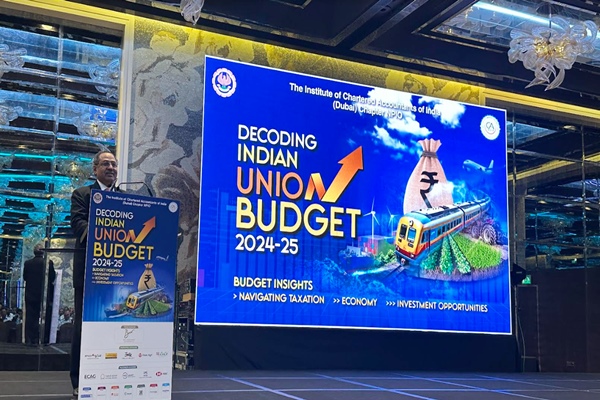India’s latest Union Budget has set the stage for a potential economic boom, according to financial experts. At a session organized by the Institute of Chartered Accountants Dubai, industry leaders applauded the government’s strategic approach to fostering growth while maintaining fiscal responsibility.
CA Girish Ahuja, a renowned author and tax expert, highlighted India’s success in narrowing its fiscal gap, a feat many global counterparts are struggling to achieve. “India is positioning itself as a beacon of financial stability,” Ahuja remarked. He noted the consistent growth in GST and direct tax revenues, with annual increases of 100-120 basis points over the past three years. This fiscal prudence, Ahuja suggested, could lead to a potential two-notch upgrade in India’s credit rating, potentially attracting significant foreign investment.
The budget’s comprehensive approach addresses critical areas such as agriculture, renewable energy, and real estate, laying the groundwork for balanced economic expansion. Innovative schemes linking rural households to the energy sector promise to create additional income streams for India’s heartland. A. Balasubramanian, Managing Director & CEO of Aditya Birla Sun Life AMC Limited, emphasized the budget’s multifaceted benefits.
“This isn’t just a budget; it’s a roadmap for sustainable economic transformation,” he stated. Balasubramanian praised the government’s focus on long-term growth over short-term populist measures, projecting a potential GDP growth rate exceeding 8%. The investment landscape has undergone a dramatic shift, with the equity market experiencing unprecedented growth. Mutual fund assets have surged from 6 lakh crore to 30 lakh crore in just a decade, reflecting increasing domestic participation in capital markets.
Experts agree that the budget’s emphasis on innovation, infrastructure, and next-generation reforms underscores India’s commitment to long-term economic success. As global investors watch closely, the 2024-25 budget may well be remembered as a turning point in cementing India’s position as an economic powerhouse.
This strategic financial planning, coupled with improved tax compliance and a thriving investment climate, sets the stage for what many believe could be India’s decade of unprecedented growth and prosperity. The government’s balanced approach, focusing on fiscal responsibility while stimulating key sectors, positions India as a model of economic management in an increasingly complex global landscape.














